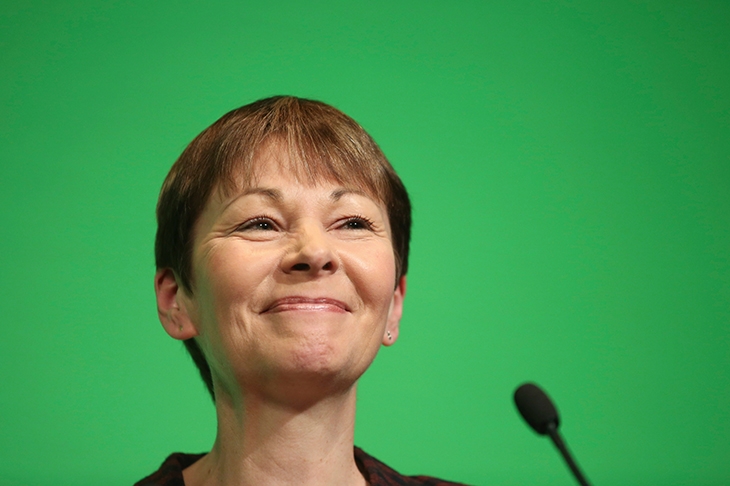I wonder what Jacques Derrida would have made of the new leader of the UK Independence party? In the philosopher’s typically readable and sensible tract On the Name, Derrida muses: ‘The name: What does one call thus? What does one understand under the name of name? And what occurs when one gives a name? What does one give then?’ All good questions, Jacques. The new leader of Ukip is called Dick Braine. I expect he will prefer, perhaps insist, upon being known as ‘Richard’. Or perhaps this is the way Ukip intends to continue, with its rapidly changing leaders henceforth each chosen for an apt and mildly offensive nomenclature: Bob Wankpuffin, Vicky Shitgibbon and so on. Why do they go on, now that they have been eclipsed by the I Can’t Believe It’s Not Ukip party? Pique? Nothing else to do with their time? Existential despair?
The Green party, meanwhile, is led by two metropolitan posh and youngish Londoners, as you might expect, but its most formidable politician is the vaguely reptilian Caroline Lucas — who, perhaps unfairly, I sometimes imagine swallows live small family pets, such as guinea pigs or gerbils. Despite this, I quite like her. I disagree with her about almost everything, now that the Green party has forsaken looking after the environment to focus on the ever-expanding hierarchy of human victimhoods and intersectionality. But she seems to me a pretty competent operator.
I like her all the more now she has decided to have her cake and eat it and thus, unwittingly, exposed the stark doublethink in modern feminism. Lucas said that she wished to convene an all-female cabinet of ‘national unity’ to put a brake on this pesky Brexit business, with women MPs from all parties delegated to be members. They would bring to the issue, she said, a ‘different perspective’. How so? According to Lucas, women ‘tend to be less tribal… they tend to find it easier to establish trust’. I assume these women would travel to each of their cabinet meetings via public transport, so as to save the planet and also to avoid difficult parking issues. You can fill in here, if you like, more gratuitously sexist jokes about what an all-female cabinet would get up to — stuff about shoes, maybe, or the aptness of such a cackling convocation devoted to addressing the problem of what, exactly, will happen on Halloween this year.
A lot of people have hammered Lucas for her own evident sexism. And yet it seems to me that she may well be right. It is true that previous women leaders, at home and abroad, have not quite conformed to the sexual stereotype outlined by Caroline. Mrs Thatcher was not a notably consensual individual. And you would have been ill advised to disagree with Mrs Bandaranaike of Ceylon and still less Golda Meir or Eva Perón.
But in general, Lucas seems to be correct. A 2004 study by Sarah Childs of female MPs in the House of Commons concluded: ‘The majority subscribed to the view that women do have a different style of politics. Women prefer a “less combative and aggressive style”. They “don’t do as much standing up, shouting on the floor of the House”. Women are more “measured”. Another woman MP, while admitting that some women are “shouty”, said she preferred to adopt an approach in which one recognises that there will have been “some merit in what was done before”.’ The majority quoted in this case was about two thirds.
Less adversarial, less ‘tribal’, as Lucas put it, more ready to form a consensus. It may well be, then, that women in general are better suited to administer a democratic government than men. But why should this be the case? I thought we were enjoined to believe that there were no inherent differences between men and women and that the macho man and the submissive woman were effectively myths — societal constructs which had nothing to do with how men and women really are?
This is the problem. The differences between men and women are, of course, vast, but modern feminism will acknowledge this fact only when it suits it. It suits it when we are discussing the statistics for violent crime, for example, which is almost the exclusive preserve of men, and it suits it when Caroline Lucas is bemoaning, by implication, the nastily tribal character of the male-dominated House of Commons and how women could sort it out much better if the men were put back in their squalid little boxes and told to shut up for a while.
It most emphatically does not suit it when we are discussing comparative achievements in the hard sciences both at school and at university, despite decades of supposedly progressive measures designed to adjust the enormous imbalance; or the fact that there are very few female heart or brain surgeons and virtually no male speech therapists. And yet the qualities which make women excellent speech therapists may be related to those which also make them consensual administrators, much as the male brain’s aptitude for the unarguable certainties of physics and maths might be an impediment to the vagaries of political discussion.
So we should go along with Caroline Lucas’s suggestion and convene a cabinet solely comprised of women. And then, as a corollary, see what happens when they have to make a hard decision, which they will have to do, seeing as 31 October is looming before us. Social research tends to suggest that men are risk-hungry, women are risk-alert: in other words, women take far longer to reach a decision, whereas men, in an often cavalier manner, will cut to the chase. Which is, perhaps, why more men than women become MPs in the first place — an ability to evaluate quickly, even if they get stuff wrong. These differences between us, then, are at the same time fascinating and complementary. They are also real, as Caroline Lucas would seem to be suggesting.







Comments